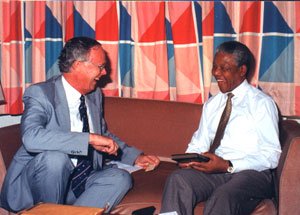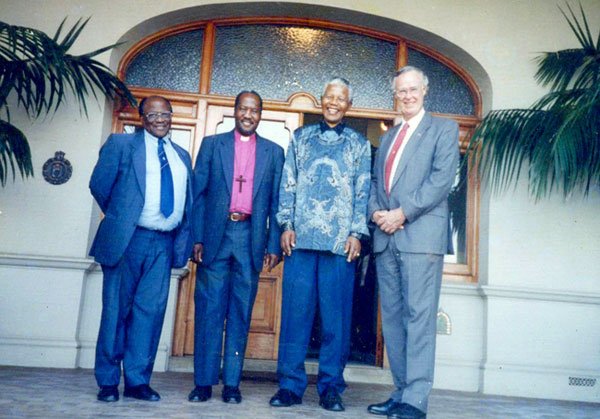
As one of the Lausanne Co-Chairs, it is my privilege to greet you all at this Christmas/New Year season and wish upon you all the Lord’s most choicest blessings at this very special time of year when we remember our Saviour’s incarnation and the hope, light and love he brought, and continues to bring, to the world.
I am writing to you in the immediate aftermath of the death of Nelson Mandela here in South Africa. I would like to share with you a few thoughts first of tribute and then of perspective.
It is arguably so that never in the history of the world, to the best of my knowledge, has there been quite such a moment of universal tribute and sense of both admiration and loss as has been poured out all across Planet Earth at the moment of passing of this truly great man. The deaths of Churchill, Kennedy, Martin Luther King, and maybe Princess Diana all deeply touched the world and for different reasons. But the passing of Mandela has been something unique, I think, in the annals of world history in the degree of acclaim which has been lavished on this single individual.
I have asked myself in these days what it is that has brought about this sense of profound admiration and of deep loss everywhere evident at this time at the passing of Mandela.
I think it is because at the depth of every human being, even the most sinful or wayward ones, there is a profound sense of admiration for the rightness and godliness of the spirit of forgiveness, reconciliation and large heartedness manifested by Mandela. It seems inconceivable almost to all that a man could come out of a 27 year period of cruel incarceration in prison, and still manifest the spirit of forgiveness and reconciliation. This is what has made everybody marvel. That is what has endeared this man most deeply to the world. Most of us find forgiveness difficult, especially if we feel we have been deeply wronged. To reconcile with those who have perpetrated such wrongs upon us over such an extended period of time seems to constitute a bridge too far and an ask too extravagant. But this is what our Madiba did.
And of course for this, South Africa most particularly, has to and will remain eternally grateful; likewise the world, which has seen an example and demonstration of real goodness. We all wish we could be like that.
This brings me to the particular challenge before South Africa at this time, and that is whether we can receive the baton he sought to pass on to us. Can we live the Mandela legacy? Can we rise to the Mandela heights of forgiveness and reconciliation? Can we emulate that heart of non-racialism and respect for every individual person regardless of colour, creed or background?
All of this says that the one way South Africa can express its true gratitude to this man is to try and live out his legacy so that this country, which in many ways is the workshop of the world, can indeed become the shining light Mandela wanted it to be.

However, in the midst of all of this global euphoria and admiration for the character and life of Nelson Mandela, I believe it is extremely important, especially for all in The Lausanne Movement, to keep a proper sense of perspective on all people and situations relating to man’s earthly pilgrimage.
This is why in these days I have been most deeply challenged afresh by Isaiah 6:1 where we read that: “In the year that King Uzziah died, I saw the Lord.” This year in which Uzziah died was around 740 BC and marked the death of a king who had had a 52 year reign over Judah, most of it monumentally successful until the last few years of his reign. So successful had this king been that the eyes of all in Judah had been fixed so fully upon him, and it was very hard for God’s people at that time to conceive of a post Uzziah era. It would seem that their eyes were so fully on Uzziah that they and others around the nation of Judah had to receive from the prophet Isaiah a massive weight of “woes,” as passionately expressed in Isaiah chapter five. It would seem that so fully were the eyes of the people upon Uzziah that they had been deflected from the Lord. Maybe in measure even the eyes of the prophet.
But now the unthinkable happens, Uzziah dies. And this is the year in which Isaiah “saw the Lord.”
In South Africa it has been almost impossible for us to conceive of a post Mandela era, and even now the nation is grappling with this challenge. Some newspapers and people are even saying he is South Africa’s new Christ figure. And will always remain so. This is spiritually perilous because it can lead us to divert our eyes from the real Christ figure to the substitute one. Yes, we honour Mandela, but we dare not worship him or venerate him in categories which take our eyes away from the Lord himself. When Isaiah saw the Lord, of course, we read that he saw him “sitting upon the throne, high and lifted up.” This is the God who is sovereign, Lord of all, and on the throne of all history and of the universe. Isaiah also saw him, as hailed by the heavenly host, “holy, holy, holy” with the “whole earth full of his glory” (v. 3). This is how all of us in The Lausanne Movement need to see the Lord afresh as sovereign, as King of the Universe, as Lord of history, and as “holy, holy, holy.”
And it is this God, who is the God and Father of our Lord Jesus Christ, whom we in The Lausanne Movement are called upon to proclaim to the very ends of the earth at this profoundly challenging moment in what could be the Home Straight of history. This adds urgency to the fulfilling of the evangelistic task. We honour great men and women. But we worship Jesus Christ and proclaim him as Lord and Saviour of the world. We allow people to celebrate the lives of great men and women, but far more importantly we call on them to repent and believe in the Lord Jesus Christ whose name is above every name and before whom in due time “every knee will bow and every tongue confess that Jesus Christ is Lord, to the glory of God the Father” (Philippians 2:9-11).
So, dear brothers and sisters all over the world in The Lausanne Movement, may we use this moment of celebrating the life of a great man also to launch out in new dedication to the fulfilling of the Great Commission.
And we also ask our God for that perspective whereby we register, in the words of the poet, that
“Sceptre and Crown must tumble down,
And in the dust be equal made
With the poor crocked scythe and spade.”
Dear ones, may the Lord bless you all this Christmas with a mightier sense of his presence than ever before. And may 2014 see us launch out into new movements of evangelism and mission never seen before in the world.
God bless you all.
Michael Cassidy, Honorary Co-Chair
Caption for photographs:
Photo 1: Pietermaritzburg, 1992.
Photo 2: Durban, 1996: Michael Cassidy worked with Mandela, along with Bishop Matthew Makhaye and Bishop Mmutlanyane Mogoba on Project Ukuthula, (Zulu for ‘peace’). Twenty people were dying daily in KwaZulu-Natal in the conflict between the ANC and IFP. This was threatening the holding of the province’s first Provincial Elections. ‘We politicians cannot fix this thing’, confessed Mandela, ‘maybe you church people can do it.’ With God’s help, Project Ukuthula in six weeks brought the death rate down to zero and peaceful elections were held in KwaZulu-Natal.

